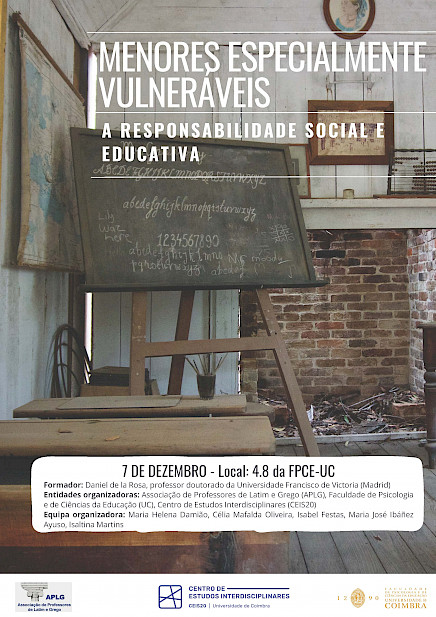
Especially vulnerable minors: Social and educational responsibility
With the publication of Decree-Law No. 54/2018, of July 6, the inclusion of students in compulsory education gained new meaning in the Portuguese education system. The regulations explain that “it aims to respond to the diversity of needs and potential of each and every student”. Therefore, inclusion practices must necessarily respond to such diversities, including the vulnerability(ies) of students. In the action, we focus on this aspect, focusing on social and school responsibility for vulnerable minors, highlighting the role of education and training professionals. Recipients. Teachers from different teaching levels and subjects. Higher Education Students, Educators and Trainers in general.
Training Entity CCPFC/ENT-AP-0496/21
SHORT-TERM TRAINING ACTION PLAN
This training, co-organized by CEIS20, has integrated researchers Helena Damião and Isabel Festas on its Organizing Committee (Group 5 – Educational Policies and Organizations and Educational Dynamics).
Contents
1. Perspectives on inclusion and vulnerability(ies) of minors
2. Social responsibility for vulnerable minors
3. Educational responsibility of the school
4. Responsibility of education and training professionals
Goals
1. Return to the concepts of “inclusion” and “vulnerability”
2. Reflect on the responsibility of social institutions (especially schools) and their professionals
Former
Daniel de la Rosa Ruiz, PhD professor at the Francisco de Victoria University (Madrid)
Mixed Regime
In-person – Location: 4.8 of FPCE-UC
E-Learning – Access data subsequently sent to registrants Registration: https://forms.gle/vhqPV6TzKrGsw6x27
Date
December 7, 2023
No. hours. 3 hours – 5pm to 8pm
Organizing entities
Association of Latin and Greek Teachers (APLG) | Faculty of Psychology and Educational Sciences of the University of Coimbra | Master's Degree in Inclusive Education and Knowledge Society | Center for Interdisciplinary Studies (CEIS20) at the University of Coimbra
Organizing team
Maria Helena Damião, Célia Mafalda Oliveira, Isabel Festas, Maria José Ayuso, Isaltina Martins
Bibliographic references
- de la Rosa Ruiz, D., Giménez Armentia, P. & de la Calle Maldonado, C. (2019). Education for sustainable development: the role of universities in the 2030 Agenda. Revista Prisma Social, (25), 179–202. https://revistaprismaso-cial.es/article/view/2709
- Giménez Armentia, P., de la Rosa Ruíz, D. & Barahona Esteban, Á. (2021). The role of the University in eradicating poverty and inequality: Education for social responsibility. Notebooks Salmantinos de Filosofía, 47, 353–380. https://doi.org/10.36576/summa.132194
- de la Rosa Ruiz, D., Giménez Armentia, P. & Barahona Esteban, A. (2022). An educational proposal for comprehensive training from the University. Prisma Social Magazine, (37), 58-81. https://revistaprismasocial.es/article/view/4614
- de La Rosa-Ruiz, D. (2023). Measurement and analysis of education for sustainable development in vulnerable environments within the framework of the 2030 Agenda. International Journal of Sociology of Education, 12(3), 293–316. https://doi.org/10.17583/rise.12351
Biographical note from the trainer/lecturer
Degree in Humanities and Journalism and Teaching. Professor of Social Responsibility at the Department of Humanities at the Francisco de Victoria University (Madrid). Director of the Santander Chair of Social Responsibility. His main line of research is education for social justice and the role of schools in training, as well as education for vulnerable minors.

